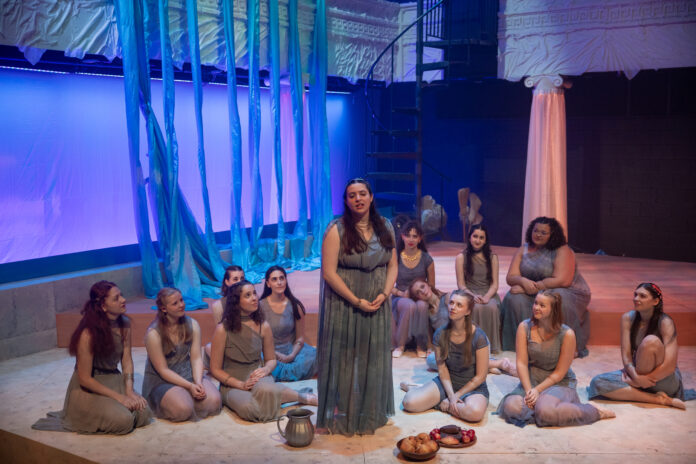
From Sept. 26-29, students filed into the Studio Theater for the Muhlenberg Theatre and Dance Department’s production of “The Penelopiad.” Written by famed Canadian playwright, poet and novelist Margaret Atwood, “The Penelopiad” retells Homer’s “Iliad” and “Odyssey” through a feminist lens. Described by Alex Piteris ‘27 (Penelope) as a “difficult but rewarding piece,” viewers were informed of mature content such as execution, betrayal, violence and sexual and emotional abuse. Despite the difficulty of the piece, Director Jessica Bostock, her creative team and the cast used artistry to bring these subjects to light, prompting audience members to question the influence of gender and power dynamics in our modern world.
While Homer’s works follow Odysseus’ 10 year voyage back to Ithaca after becoming a hero in the 10 year long Trojan War, Atwood’s piece instead centers Penelope, Odysseus’ wife and Princess of Sparta. The plot follows her and her 12 maids as they spend 20 years laboring to maintain Ithaca and ward off suitors.
Stepping into the theater, a sheer fog descends over the audience. As the lights dim and the play begins, we are first introduced to the titular character, Penelope. While “The Penelopiad” is largely an account of her time among the living, the Penelope we meet here resides in the Underworld. As our narrator, she knows everything but is able to affect nothing.
As Natalie McElhinny ‘25, one of the play’s dramaturgs, contextualizes within the show’s playbill, “The Penelopiad” is in many ways a show about remembering. McElhinny writes of ancient Greek beliefs connecting remembrance to life after death, stating, “Once a soul is forgotten in the human world, that soul is moved to Tartarus, the place of torture [in the underworld]. By retelling Penelope’s story from her own perspective, audiences are able to remember Penelope, and more importantly, remember the maids who have been intentionally omitted from this narrative. Memory keeps them alive.”
As the play progresses, one watches characters adorned in diaphanous blue fabrics travel through the events of Penelope’s life. We witness her marriage to Odysseus and the split second of marital bliss she experienced before Odysseus was bound for Troy. In his absence, we see the growth of Telemachus, Penelope and Odysseus’ son, and his endeavors to run the state. As the Trojan war ends and the events of The Odyssey begin, Penelope’s story starts in earnest.
With Odysseus on a 10-year journey and his fate uncertain, suitors, hungry for power, begin to court Penelope. Colluding with her maids, Penelope tells the suitors she will marry only when she finishes her father in law’s shroud; however, her maids undo each day’s work by the light of the moon. In Muhlenberg’s production, this weaving was represented by flowing swaths of fabric hung from the upper level of the stage.
At the end of the show, each maid wraps one strand of fabric around their neck. This signified their execution at the hand of Odysseus, who had not known they aided his wife and instead saw them as uncouth members of his house. Audience members were held in rapt attention as the fabric clicked free from its hold on the upper rungs of the stage, billowing to the floor as the hollow sound resonated throughout the intimate space.
“I hope audiences were able to see the human experience reflected in the characters and feel represented or seen by the external as well as the internal struggles portrayed on stage.” Alex Piteris ’27
The play ends with our narrator back in the Underworld. Here, Odysseus is constantly haunted by the presence of the maids, whose feet never touch the ground. While Penelope fears her next life would be just as painful as her first, Odysseus is constantly reviving himself through Elysium in order to have more adventures and avoid accountability for his actions. With Odysseus back in the land of the living, Penelope is left with nothing but her thoughts and is forced to confront the reality of her role in the death of her beloved maids.
Illuminating the work behind the scenes, Aidan White ‘25 (Odysseus) shared “This rehearsal process was so deeply meaningful to me. Everyone grew to care for one another and what one another brought to the table. While the show is so beautiful in so many different ways it’s also incredibly heavy, so having that support system was an absolute need. I’m so grateful for every single person who worked on that piece. I especially want to shout out our wonderful leaders, Jess Bostock, our director, Bryson Brunson ‘25, our AD [Assistant Director] and Amy O’Halloran ‘26 our PSM [Production Stage Manager], all of whom cultivated the space to be as encouraging and affirming as it was. The show absolutely could not have happened without them.”
Audience member Ava Shandler ‘28 also extended compliments to the creative team, stating, “As a fan of Greek mythology, I truly enjoyed the performance. Everything from the set, costumes, lighting and acting was incredible.”
In discussing the piece, White also reflected “The show… is truly a masterclass in redefining traditionally male narratives. ‘The Odyssey’ as a text is frankly a male vanity piece in which the titular character’s horrible actions are completely glazed over given his protagonist status. ‘The Penelopiad’ doesn’t shy away from breaking down this structure and telling a more authentic story of what the lives of these characters would be like if they had been people at this time. I hope people find encouragement from our show to tackle other narratives akin [to] the “The Odyssey” because the male dominance of narratives still dominates media today.”
Piteris also expressed gratitude towards the piece, adding, “I’m so incredibly grateful to have been a part of making it come to life with everyone. I hope audiences were able to see the human experience reflected in the characters and feel represented or seen by the external as well as the internal struggles portrayed on stage.”
Elucidating the experience as an audience member and summing up the play, Nola Thompson ‘27 shares, “‘The Penelopiad’ was one of the hardest performances I’ve ever watched, but I am so grateful that I had a chance to. It brilliantly blended classical Greek mythology with themes of sexual assault and feminist theory to express the objectification and sexualization of women with slight undertones of female resilience and subtle defiance. I left the theater thinking very hard about my place in the world as a woman and how I can celebrate my womanhood.”
Emma Northrop '27 is a History and English major at Muhlenberg. She loves writing for the Weekly, and is immensely excited to be the assistant editor of Arts & Culture! When not at the Weekly, she loves reading her favorite fantasy novels, visiting the Farmer's Market, and scrapbooking.





















